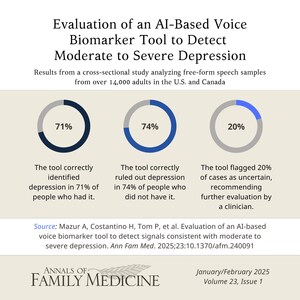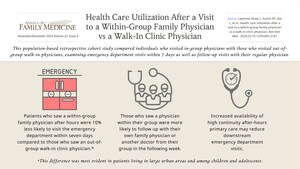PROVIDENCE, R.I., July 11, 2024 /PRNewswire/ -- Findings from a new study published in Annals of Family Medicine reveal an association between long-term use of sulfonylureas and increased risk of impaired awareness of hypoglycemia, or low blood sugar, in patients with type 2 diabetes. The research highlights a critical concern for diabetes management, because patients using sulfonylureas for extended periods may face higher risks of dangerously low blood sugar levels without recognizing the symptoms.
Sulfonylureas increase insulin production regardless of blood sugar levels and can cause blood sugar to drop too low, leading to hypoglycemia. Repeated episodes of hypoglycemia can impair patients' ability to recognize low blood glucose levels. The study aimed to compare how the duration of sulfonylurea use affects the prevalence of hypoglycemia unawareness in patients with type 2 diabetes, in comparison to insulin users.
The study found:
- Up to 94.3% of participants, half male and half female and mostly aged 40-69, visited a clinician as an outpatient every 2-3 months for diabetes care. For participants who used the medication for less than a year, the prevalence of impaired awareness of hypoglycemia in sulfonylurea users was 47.8% (Gold) and 30.4% (Clarke). The prevalence increased to 70.7% (Gold) and 56.9% (Clarke) for users treated with sulfonylurea for more than five years.
- For insulin user participants who used the medication for less than a year, the prevalence of impaired hypoglycemia awareness was 57.3% (Gold) and 30.1% (Clarke). This decreased to 41% (Gold) and 28.2% (Clarke) for participants who used the medication for more than five years.
- Regular ambulatory care with tests, including blood glucose and retina exams, was associated with lower odds of impaired awareness of hypoglycemia in both sulfonylurea and insulin users.
These findings underscore the heightened risk of hypoglycemia unawareness associated with long-term sulfonylurea use. Given the affordability and widespread use of sulfonylureas in treating type 2 diabetes, these findings are important for guiding treatment decisions. Current guidelines recommend newer classes of medications that offer a reduced risk of hypoglycemia.
Article Cited:
Long-Term Sulfonylurea Use and Impaired Awareness of Hypoglycemia Among Patients With Type 2 Diabetes in Taiwan
Hsiang-Ju Cheng, MD, MS; Siou-Huei Weng, MS; Jia-Ling Wu, PhD; Shu-Tin Yeh, MD; Hua-Fen Chen, MD, MS; Hermina Novida, MD; Huang-Tz Ou, PhD; and Chung-Yi Li, PhD
Annals of Family Medicine is a peer-reviewed, indexed research journal that provides a cross-disciplinary forum for new, evidence-based information affecting the primary care disciplines. Launched in May 2003, Annals of Family Medicine is sponsored by seven family medical organizations, including the American Academy of Family Physicians, the American Board of Family Medicine, the Society of Teachers of Family Medicine, the Association of Departments of Family Medicine, the Association of Family Medicine Residency Directors, the North American Primary Care Research Group, and the College of Family Physicians of Canada. Annals of Family Medicine is published online six times each year and contains original research from the clinical, biomedical, social, and health services areas, as well as contributions on methodology and theory, selected reviews, essays, and editorials. Complete editorial content and interactive discussion groups for each published article can be accessed for free on the journal's website, www.AnnFamMed.org.
SOURCE Annals of Family Medicine

WANT YOUR COMPANY'S NEWS FEATURED ON PRNEWSWIRE.COM?
Newsrooms &
Influencers
Digital Media
Outlets
Journalists
Opted In





Share this article